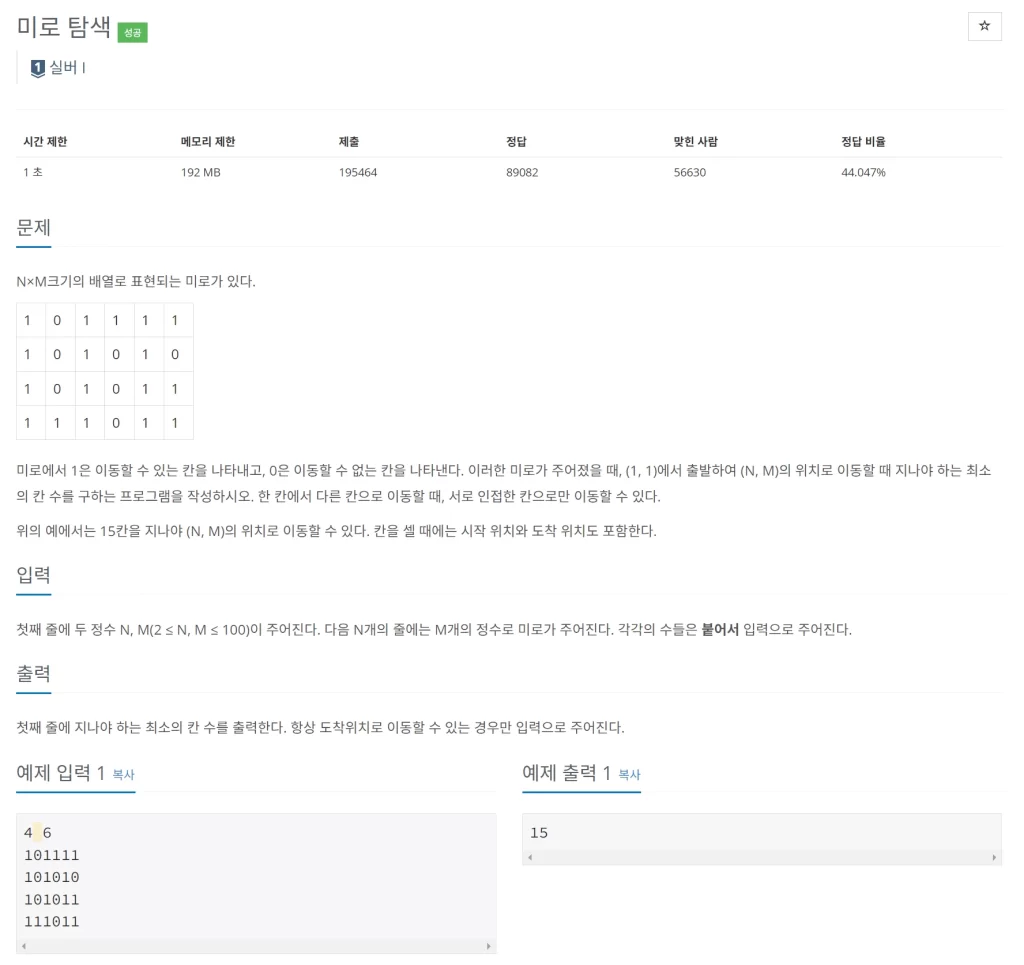문제 내용은 입력으로 배열을 받은 뒤, 0,0 에서 시작해서, 배열 끝으로 도달하는 경우 중, 가장 최소한의 움직임으로 도달할 수 있는 경우를 찾아줘야 하는데
import java.io.BufferedReader;
import java.io.IOException;
import java.io.InputStreamReader;
import java.util.Arrays;
import java.util.LinkedList;
import java.util.Queue;
public class Main {
static int[][] map;
static int min = Integer.MAX_VALUE;
public static void main(String[] args) throws IOException {
BufferedReader br = new BufferedReader(new InputStreamReader(System.in));
int[] array = Arrays.stream(br.readLine().split(" ")).mapToInt(Integer::parseInt).toArray();
map = new int[array[0]][array[1]];
for (int i = 0; i < map.length; i++) {
int[] input = Arrays.stream(br.readLine().split("")).mapToInt(Integer::parseInt).toArray();
for (int j = 0; j < map[i].length; j++) {
map[i][j] = input[j];
}
}
boolean[][] visited = new boolean[array[0]][array[1]];
bfs(new Progress(new int[]{0, 0}, visited, 0));
System.out.println(min);
}
public static void bfs(Progress prog) {
Queue<Progress> queue = new LinkedList<>();
prog.visited[prog.loc[0]][prog.loc[1]] = true;
prog.count += 1;
queue.add(prog);
while (!queue.isEmpty()) {
Progress newProg = queue.poll();
if (newProg.loc[0] == map.length - 1 && newProg.loc[1] == map[0].length - 1) {
min = Math.min(min, newProg.count);
return;
}
int[] dx = {0, 0, 1, -1};
int[] dy = {1, -1, 0, 0};
for (int k = 0; k < 4; k++) {
int nx = newProg.loc[0] + dx[k];
int ny = newProg.loc[1] + dy[k];
if (nx >= 0 && nx < map.length && ny >= 0 && ny < map[0].length) {
if (!newProg.visited[nx][ny] && map[nx][ny] != 0) {
newProg.visited[nx][ny] = true;
queue.add(new Progress(new int[]{nx, ny}, newProg.visited, newProg.count + 1));
}
}
}
}
}
static class Progress {
int[] loc;
boolean[][] visited;
int count;
Progress(int[] loc, boolean[][] visited, int count) {
this.loc = loc;
this.visited = visited;
this.count = count;
}
}
}문제를 풀어보자면, BFS로 문제를 풀되, Queue에 현재 위치, visited(방문) 배열, 움직인 횟수를 넣어 Queue를 돌려 모든 케이스를 다 확인해 보면서, 가장 적게 움직인 횟수를 출력해주면 되겠다


Leave a Reply